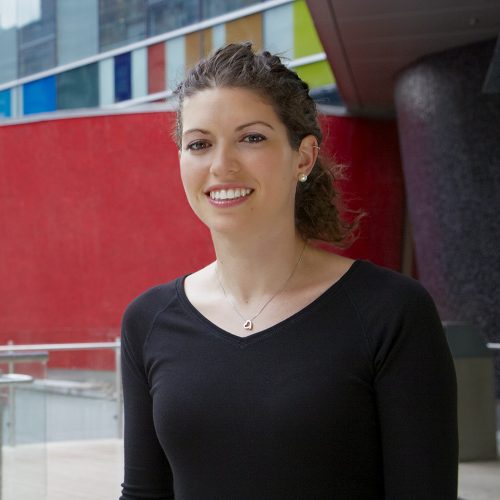Nadine Borduas

Nadine Borduas
Alumna, PhD (2015), Chemistry
“Despite U of T's size, they know you as an individual, not a number.”
I chose to study Environmental Chemistry because it combines two of my interests: the outdoor environment and chemistry.
I grew up in Montreal and attended the Université de Sherbrooke for undergraduate studies where I was seduced by synthetic organic chemistry. In a co-op program, I combined my passion for travel with chemistry, working in academic and industrial organic chemistry labs in Canada, England, and Germany.
It was a natural progression to attend graduate school. I moved to Toronto for my master’s in organic chemistry. However, for my PhD, I decided to return to environmental chemistry. I’m excited about having a synthetic background and being able to contribute in a unique way to environmental chemistry research.
My PhD research focuses on understanding the fate of potential pollutants in the atmosphere. I assess their fate by measuring how long these pollutants live in the atmosphere, the products they produce, and the mechanisms involved in their production.
I’m particularly interested in nitrogen-containing molecules which are used in unprecedented quantities in carbon capture and storage technology. Some of these compounds lead to the formation of isocyanates which may be potentially harmful to human health. I use mass spectrometry techniques to study these nitrogen-containing molecules in the laboratory and in ambient air.
During my master’s studies at U of T, I was impressed by the calibre of its research facilities. The University offers countless opportunities to get involved within and outside chemistry, which was important for me. The quality of professors and graduate students and the high-impact research at U of T sealed the deal for me.
U of T is one of the best choices for my career. It promotes a stimulating research environment and offers its students countless opportunities to follow their dreams and to make a difference.
I’ve been involved with the graduate student association, served on search committees for Chairs and Deans, and mentored undergraduate students. Science outreach opportunities abound. U of T also recruits talented and committed professors. The administrative staff makes the university a fantastic community in which to work and study. Despite U of T’s size, they know you as an individual, not a number.
I have countless plans after completing my PhD. The most important ambition I have is to make a difference.
I’m interested in academics — teaching the next generation of chemists. I want to conduct cutting-edge research to address environmental issues. I’d also like to become a policy maker and remain active in science outreach activities.
My advice to prospective students is to find a project that you are truly passionate about and pursue it. With passion, you’ll persevere to find an answer to the problem.
You chemistry enthusiasts will never run out of research possibilities! Chemistry is diverse — from biochemistry to theoretical chemical physics through organic and materials chemistry — every chemical subfield is relevant! Chemical knowledge will be crucial in addressing the energy crisis and in understanding climate change and its impacts. You’ll likely have many job opportunities after graduate school.
